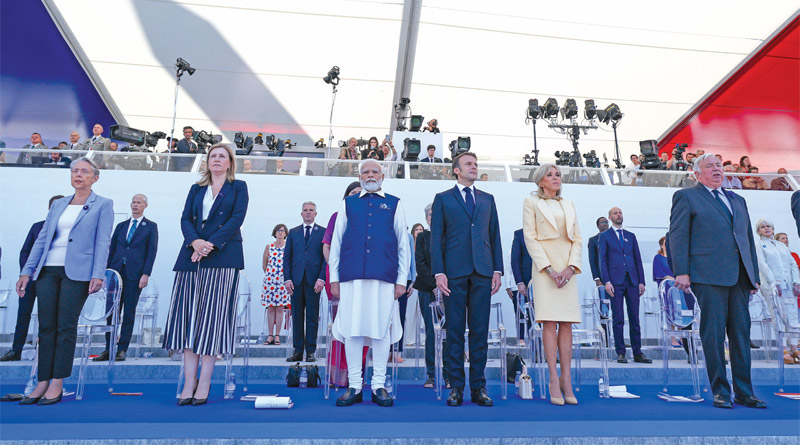Prime Minister Modi’s visit strengthens France-India ties, unveils key initiatives
A FORCE Report
Prime Minister Narendra Modi’s visit to France on July 13-14 marked a significant step towards strengthening the bilateral relationship between the two nations. As a guest of honour in the July 14 parade, India’s participation highlighted the deepening partnership with France and resulted in the announcement of several key initiatives. These initiatives encompassed various sectors, emphasising the long-term vision for cooperation between the two countries.

Defence cooperation took centrestage during the visit, with the Indian Defence Acquisition Council (DAC) clearing the purchase of 26 Rafale Marine for the Indian Navy and three additional Scorpene submarines to be built at the Mazagon Dock Limited, following the completion of the P-75 programme under which the Mumbai-based shipyard had constructed six boats in collaboration with the Naval Group. The Indian Air Force already operates 36 Rafales.
Space collaboration between France’s CNES and India’s ISRO was further enhanced. Agreements were reached on reusable launchers, joint earth observation satellite Trishna, and a constellation of maritime surveillance satellites in the Indian Ocean. Additionally, measures to protect Indo-French satellites in orbit were discussed, solidifying the cooperation in space technology.
Civil nuclear energy emerged as another area of focus, with progress made on the 6-EPR power plant project in Jaitapur. Both countries decided to launch a cooperation programme for small modular reactors (SMRs) and advanced modular reactors (AMRs), leveraging nuclear energy for sustainable development.
Recognising the significance of the Indo-Pacific region, France and India adopted a joint roadmap for actions covering security, economics and development. Efforts are underway to establish an Indo-French development fund, promoting sustainable development projects in the region. Counter-terrorism cooperation was reinforced through strengthened ties between France’s GIGN and India’s National Security Guard, aimed at enhancing joint efforts in countering terrorism and ensuring the safety of both nations.
Cutting-edge technology collaboration was emphasised, particularly in the areas of supercomputing, cloud computing, artificial intelligence and quantum computing. An agreement between Atos and India’s Ministry of Earth Sciences was announced, securing the supply of supercomputers.
In the field of civil aviation, technical and safety agreements were signed to support the expansion of routes between France and India, facilitating growth in the Indian civil aviation market and promoting people-to-people exchanges.
Both nations expressed their commitment to combat plastic pollution by advocating for an international treaty addressing plastic waste throughout its life cycle, contributing to environmental sustainability. Health cooperation gained momentum through a signed letter of intent, focusing on hospitals, medical research, digital technology, biotechnology, public health and combating microbial resistance.
A partnership between France’s IFREMER and India’s NIOT was established, enhancing collaboration in the blue economy and ocean research, in line with the Roadmap on Blue Economy and Ocean Governance. Efforts to support the ecological transition were highlighted through France’s commitment to financing India’s sustainable cities programme, CITIIS 2.0. Additionally, funding was allocated to the South Asia Growth Fund (SAGF III) and Satya Microcapital, promoting energy efficiency, clean energy, and empowering rural Indian women.
A partnership between McPhy and L&T was formed aiming to manufacture electrolysers in India, aligning with the Indo-French roadmap for decarbonised hydrogen. People-to-people ties were strengthened through initiatives such as welcoming 30,000 Indian students in France by 2030, visa facilitation measures, increased resources for the Campus France network, and collaboration between educational institutions.
Diplomatic and consular networks were expanded with the opening of a Consulate General of India in Marseille and a Bureau de France in Hyderabad, fostering bilateral exchanges and cooperation.
Cultural cooperation received a boost with France chosen as India’s partner for establishing a major national museum in New Delhi. An agreement between France Médias Monde and Prasar Bharati facilitated the exchange of audio-visual content in areas such as culture, education, science and sports.
Research collaboration was reinforced through increased funding for the Indo-French Centre for the Promotion of Advanced Research (IFCPAR/CEFIPRA), promoting joint research projects and academic cooperation.
The commitment to civil society was reiterated, aiming to double the number of international volunteers in both India and France by 2025, promoting cross-cultural understanding and collaboration.

